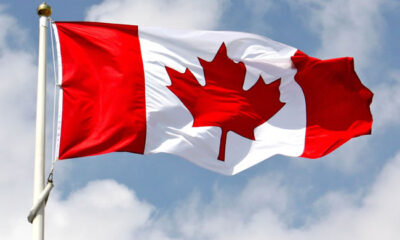Scholarships
Masters (MS) In Canada: Top Universities, Fees, Eligibility & More

Masters in Canada attracts many international students. As of 2020, 216,195 Canadian master’s degree students were enrolled, according to Statista Research Department. Canada, one of the world’s most student-friendly countries, is on every study abroad aspirant’s list. . The best Canadian institutions’ vast selection of courses and excellence in education and research are responsible for such a large number of students choosing to study masters in Canada. Second, masters scholarships in Canada help students manage their finances. Overall, a Canadian master’s degree provides high-quality education, meaningful experiences, and career advancement.
We discuss MS in Canada for international students, including the best colleges, courses, program fees, job opportunities, and more in this blog. If you want to pursue masters in Canada, this blog will help.
Why Study Masters in Canada?
With low crime rates and a multicultural environment, student life in Canada is considered safe. These are just a handful of the reasons why international students should pursue a master’s degree in Canada. Let us now go over the main factors or benefits to consider when studying for an MSc in Canada:
- Canada is home to some top universities in the world that offer the best quality of education, research and job opportunities. It is worth mentioning that 28 universities from Canada have made it to the QS World Ranking of 2022 list for their excellence and accomplishments.
- Canadian universities lay special emphasis on research. They encourage students to explore and grow in all aspects of their course. The top research-centric universities in Canada include University of Toronto, McGill University, University of British Columbia, etc.
- The universities in Canada for masters charge an affordable fee for international students. Although the fee structure varies based on the programme of study you choose, it is cheaper than US and UK universities. The average cost to study MSc in Canada is 20,000 CAD to 90,000 CAD annually.
- The Canadian government offers various funding and support facilities to international students in the form of scholarships, fellowships or grants. Besides, the student visa provides the eligibility to earn while studying in Canada for 20 hours/week.
Now that we have clarity regarding why masters in Canada, let us go through the top universities in Canada for masters:
Top 10 Universities in Canada for Masters
There are numerous universities in Canada that provide the greatest MS programs. Each one excels in education, training, and research. To talk about the best universities, we have included their QS World University Ranking 2022 and annual average cost structure below:
- University of Toronto
QS World University Ranking 2022: 26
Average Fees Per Year: 50,000 CAD – 70,000 CAD
- McGill University
QS World University Ranking 2022: 27
Average Fees Per Year: 30,000 CAD – 70,000 CAD
- University of British Columbia
QS World University Ranking 2022: 46
Average Fees Per Year: 32,000 CAD – 90,000 CAD
- University De Montreal
QS World University Ranking 2022: 111
Average Fees Per Year: 20,000 CAD – 50,000 CAD
- University of Alberta
QS World University Ranking 2022: 126
Average Fees Per Year: 15,000 CAD – 50,000 CAD
- McMaster University
QS World University Ranking 2022: 140
Average Fees Per Year: 25,000 CAD – 70,000 CAD
- University of Waterloo
QS World University Ranking 2022: 149
Average Fees Per Year: 30,000 CAD – 62,000 CAD
- Western University
QS World University Ranking 2022: 170
Average Fees Per Year: 30,000 CAD – 90,000 CAD
- University of Ottawa
QS World University Ranking 2022: 230
Average Fees Per Year: 20,000 CAD – 45,000 CAD
- University of Calgary
QS World University Ranking 2022: 235
Average Fees Per Year: CAD 18,000 – CAD 40,000
Top Masters Courses in Canada
From Humanities, Sciences, Engineering to Management courses, the top universities in Canada for masters have it all. A list of top masters courses, their fee structure and popular universities in which they are offered are discussed below:
Masters in Accounting:
- Queen’s University, York University, McGill University
- Average Fees Per Year – 20,000 CAD – 50,000 CAD
Masters in Data Science:
- University of British Columbia
- University of Toronto
- HEC Montreal
- Average Fees Per Year – 40,000 CAD – 65,000 CAD
Masters in Business Administration (MBA):
- University of Toronto
- Queen’s University
- McGill University
- Average Fees Per Year – 40,000 CAD – 100,500 CAD
Masters in Management:
- University of Toronto
- University of British Columbia
- University of Calgary
- Average Fees Per Year – 30,000 CAD – 60,000 CAD
Masters in Environmental Science:
- University of Waterloo
- University of Alberta
- University of Toronto
- Average Fees Per Year – 30,000 CAD – 65,000 CAD
Masters in Engineering:
- University of Toronto
- McGill University
- McMaster University
- Average Fees Per Year – 35,000 CAD – 65,000 CAD
Masters in Psychology:
- University of Toronto
- McGill University
- Western University
- Average Fees Per Year – 25,000 CAD – 35,000 CAD
Now that we are aware of the top universities and courses in Canada, let’s discuss their eligibility criteria:
Eligibility for Masters in Canada
To apply for masters programs in Canada you must fulfil certain eligibility criteria. The requirements vary depending on the type of course and university you choose. However, some of the essential requirements to study in MS in Canada for Indian students are as follows:
- Undergraduate degree
- English language proficiency test
- GMAT/GRE scores
- Work experience
- Passport and Visa
Undergraduate Degree
One of the most important qualifications for pursuing master’s courses in Canada is an undergraduate degree in the field of study from a recognized institution. To get admitted to their master’s programs, top universities require an undergraduate CGPA of 6.0 or higher.
English Language Proficiency Test
To study masters in Canada, Indian students or students from other non-English speaking countries must first pass an English language competency test. IELTS, TOEFL, PTE, CAEL, and other tests are accepted by top master’s universities in Canada. The tests and their scores vary again depending on the university and degree, although the typical scores range from.
- 6.5 – 7.5 for IELTS
- 85 – 90 for TOEFL
- 55 – 65 for PTE
- 60 – 70 for CAEL
GMAT/GRE Scores
Another eligibility criteria for masters in Canada is GMAT and GRE scores. This is specifically for courses like MBA, MIM, MSc Finance and so on. The GMAT score to pursue the best courses for masters in Canada from the top universities is 650 and above.
Work Experience
Admission to most master’s programs in Canada requires relevant job experience. It is primarily required for expert-level courses such as the MBA in Canada. Some master’s programs, however, do not require any work experience. You can find this information on the university’s official website.
Passport & Visa
A valid passport and student visa are a must for all international students to study any course at any university in Canada. Do keep in mind to apply for your Canada student visa at least 3 months prior to the expected date of travel.
Documents Required for MSc in Canada
Here is a list of the documents you need to submit while applying for MS courses in Canada:
- Complete application form
- Copy of all academic transcripts
- Certificates from all educational institutions previously attended
- Bio-data
- Letter of recommendation
- Personal statements
- Application fee receipt
- Copy of passport
- Proof of scholarship or funding
- GRE/GMAT scores (if applicable)
- Proof of language proficiency test to study in Canada (IELTS, TOEFL, PTE, CAEL, etc.)
- Work experience certificates
How to Apply for Masters in Canada?
Autumn and Winter are the most popular intakes for masters in Canada for Indian students. Hence, you must be aware of the application process to avoid any confusion during the time of admission.
A step by step guide to apply for MS in Canada is as follows:
- Finalize the master’s course in Canada that you want to pursue and check for the best university offering it.
- Visit the official university website and collect all data relating to eligibility and the admission process.
- Upload scanned copies of all the required documents (transcripts, CV, IELTS/TOEFL, GMAT scorecards, etc.)
- Fill out the desired application form and pay the fee.
- You may be asked to sit for a virtual interview for certain courses. Take it as an opportunity to display your soft skills and knowledge.
- Once you receive the conditional offer letter after clearing your interview, you may book your seat at the particular university.
- Pay your deposit by agreeing to the terms and conditions of the university. The deposit here is non-refundable.
How Much Does it Cost to Study Masters in Canada?
Canada’s master’s fee depends on course and university. Lifestyle, city, and housing also matter. Budgeting intelligently can cut costs. For that, you can find well-funded scholarships, low lodging, or student discounts. These keep your Canadian masters affordable.
Tuition plus cost of living make up the cost of studying in Canada.
Tuition Fees
Domestic and international students pay different tuition fees in Canada. The fee is greater for international students. Aside from the tuition fee, international students in Canada have to pay fees for student services and other school-related activities. The typical MS cost in Canada ranges from CAD 20,000 to CAD 90,000 per year.
Cost of Living
The cost of living in Canada for international students is determined on your lifestyle. The average cost of living in Canada is roughly 10,000 CAD – 12,000 CAD per year. On-campus housing costs between 3,000-7,500 CAD per year, whereas off-campus housing costs approximately 8,000 CAD – 9,000 CAD per year.
Scholarships For Masters in Canada
Funding your master’s degree in Canada can be made easy by acquiring different scholarships that offer good benefits. There are numerous scholarships for MS in Canada for international students, most of which are based on merit. They help students fund their studies and overall stay in Canada to a great extent
- Canadian Commonwealth Scholarship and Fellowship Plan: For Students applying to programs of advanced study and research at the Masters and Ph.D. levels. Amount/ Benefit: Covers tuition fees, travel, and living allowance.
- National Research Council of Canada (NRCC): For Meritorious students pursuing Masters and PhD courses in natural science or engineering disciplines. Amount/ Benefit: Up to CAD 35,000 per year
- University of Waterloo Scholarships: Fully-funded scholarship for international students. This scholarship is offered for Undergraduate, master, and PhD studies. Amount/ Benefit: Up to CAD 10,000
- Ontario Graduate Scholarships: For all international students pursuing full-time and part-time graduate courses in Ontario with a first-class or equivalent in the qualifying exam. Amount/Benefit: CAD 15,000/ year
- University Canada West Scholarships: They are funded scholarships for international students offered for undergraduate and master’s programs. Amount/ Benefit: CAD 10,000 for master’s and CAD 20,000 for bachelor’s
- McGill University Scholarships: They are fully funded scholarships for international students offered to undergraduate, masters and PhD students. Amount/ Benefit: CAD 8,500
- University of Manitoba Graduate Fellowships: For Students pursuing graduate programs at the University of Manitoba who demonstrate superior intellectual ability and academic accomplishments. Amount/Benefit: CAD 14,000/ year.
Work Permit after Masters in Canada
You will have 180 days to apply for a Canadian work permit after your masters in accordance with the rules of the Government of Canada. In order to be eligible for a Post-Graduation Work Permit (PGWP) in Canada, you must fulfil the following requirements:
Your MSc course in Canada must be at least 8 months duration and offered by a recognized university.
You must have studied full time for each academic session without any break in between to be eligible for Work Permit Canada after your masters.
- Your MSc course in Canada must be at least 8 months duration and offered by a recognized university.
- You must have studied full time for each academic session without any break in between to be eligible for Work Permit Canada after your masters.
After three years of stay and work under the work permit, you may be eligible for Canadian Permanent Residence status. A permanent job offer from a Canadian employer will qualify you for the Federal Skilled Worker Program and pave the way for you to get permanent residency in Canada. Having a PR permits individuals to apply for all types of career opportunities in Canada following their master’s degree.
Jobs After Masters in Canada
After receiving your work permit, you will be able to apply for different jobs in Canada following your MSc. Canada, being one of the world’s major economies, is a hotspot for job opportunities. Companies such as Amazon, Apple, Deloitte, Microsoft, and others provide job opportunities after completing a master’s degree in Canada.
The following are some popular jobs and their average salaries:
- IT Analyst: 75,000 CAD – 95,000 CAD
- Social Worker: 60,000 CAD – 80,000 CAD
- Software Engineer: 80,000 CAD – 99,000 CAD
- Data Science Engineer: 92,000 CAD – 105,000 CAD
- Psychologist: 45,000 CAD – 75,000 CAD
- Public Health Advisor: 55,000 CAD – 85,000 CAD
Masters in Canada is an opportunity to avail the best quality of education from the top universities while residing in a diverse and culturally rich country. When deciding to go for an MS in Canada or any foreign country, the cost is a major concern.
FAQs
Is a masters degree in Canada worth it?
- Definitely yes! Canada is home to some of the best universities for higher education. And, masters in Canada is one of the most sought-after study programs amongst international students. Under the guidance of the top-notch faculty members, you are groomed to become a responsible, wise and respectable member of society.
What is MS in Canada cost?
- The average cost to study masters in Canada ranges from 20,000 CAD to 90,000 CAD yearly. The cost varies across universities and courses.
What are the requirements to pursue MS in Canada?
MSc in Canada requirements include:
- Undergraduate degree
- IELTS/TOEFL/PTE/CAEL scorecards
- GMAT/GRE scorecards (if applicable)
- Work experience (if applicable)
- A valid passport and visa
Can I study masters in Canada with scholarship?
- Yes. Scholarship for masters in Canada is an option available for both domestic and international students. Do gather information about different scholarships in advance to apply accordingly.






















